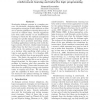Free Online Productivity Tools
i2Speak
i2Symbol
i2OCR
iTex2Img
iWeb2Print
iWeb2Shot
i2Type
iPdf2Split
iPdf2Merge
i2Bopomofo
i2Arabic
i2Style
i2Image
i2PDF
iLatex2Rtf
Sci2ools
NAACL
2001
2001
Learning Optimal Dialogue Management Rules by Using Reinforcement Learning and Inductive Logic Programming
Developing dialogue systems is a complex process. In particular, designing efficient dialogue management strategies is often difficult as there are no precise guidelines to develop them and no sure test to validate them. Several suggestions have been made recently to use reinforcement learning to search for the optimal management strategy for specific dialogue situations. These approaches have produced interesting results, including applications involving real world dialogue systems. However, reinforcement learning suffers from the fact that it is state based. In other words, the optimal strategy is expressed as a decision table specifying which action to take in each specific state. It is therefore difficult to see whether there is any generality across states. This limits the analysis of the optimal strategy and its potential for re-use in other dialogue situations. In this paper we tackle this problem by learning rules that generalize the state-based strategy. These rules are more ...
| Added | 31 Oct 2010 |
| Updated | 31 Oct 2010 |
| Type | Conference |
| Year | 2001 |
| Where | NAACL |
| Authors | Renaud Lecoeuche |
Comments (0)

